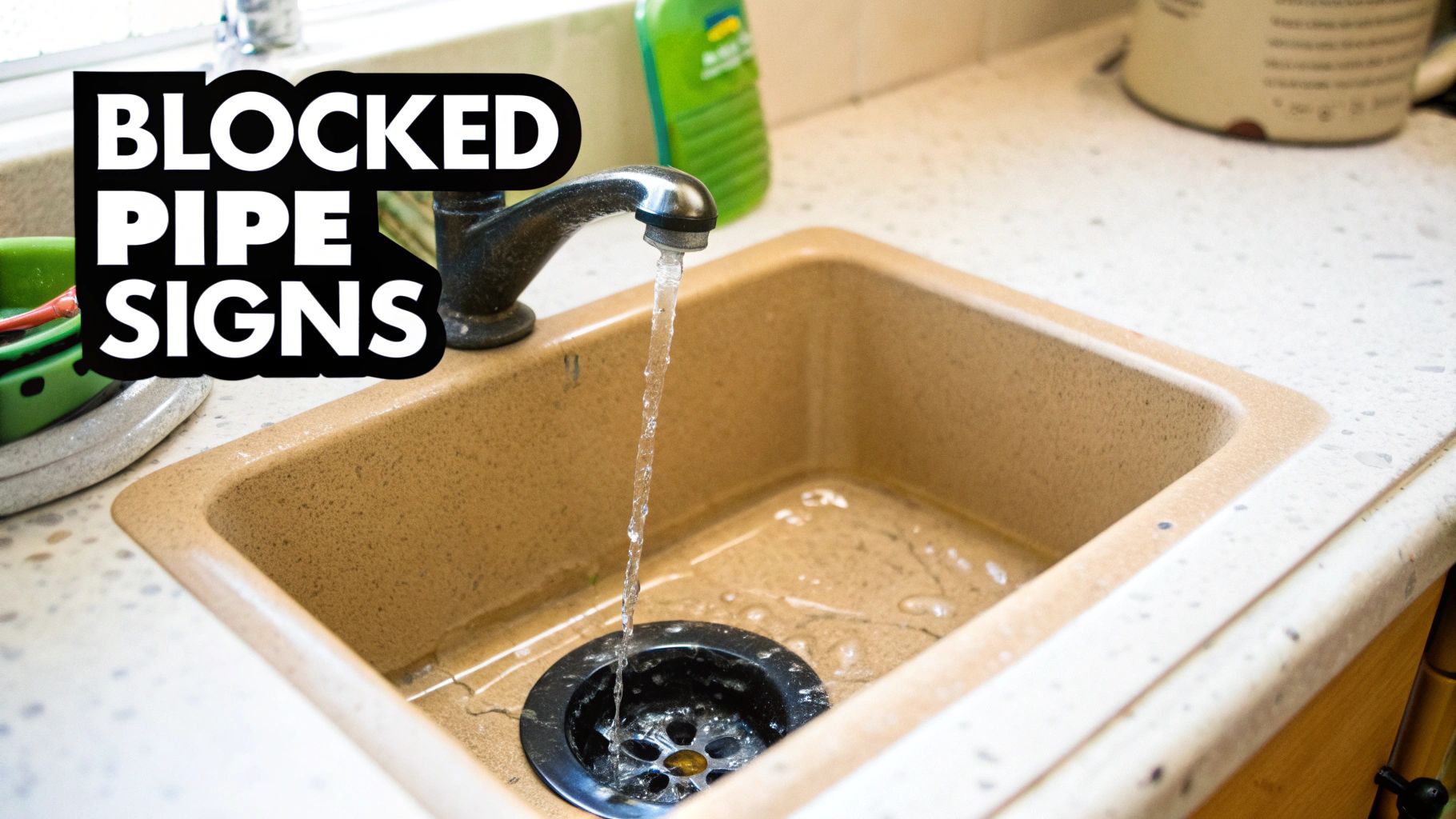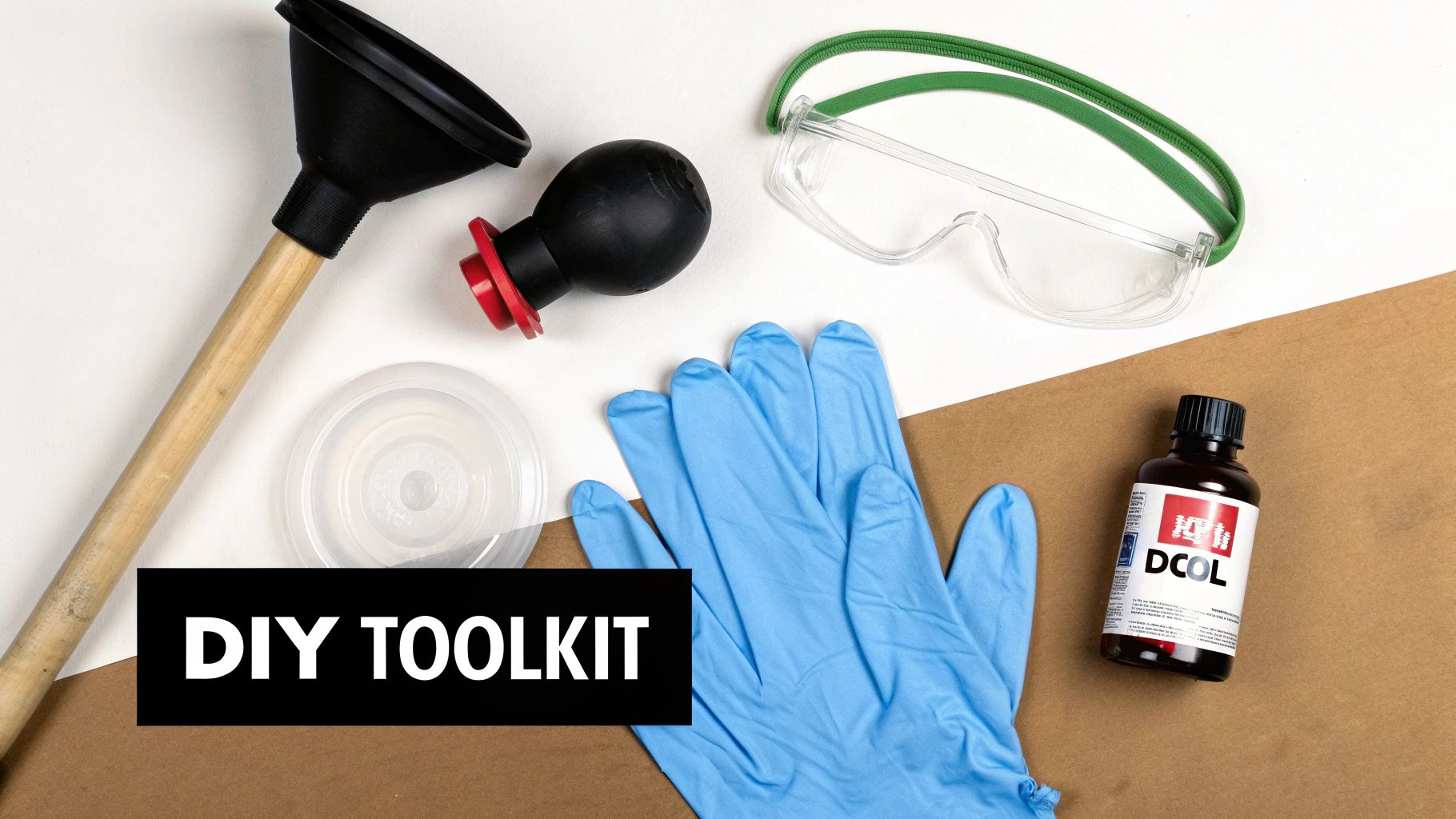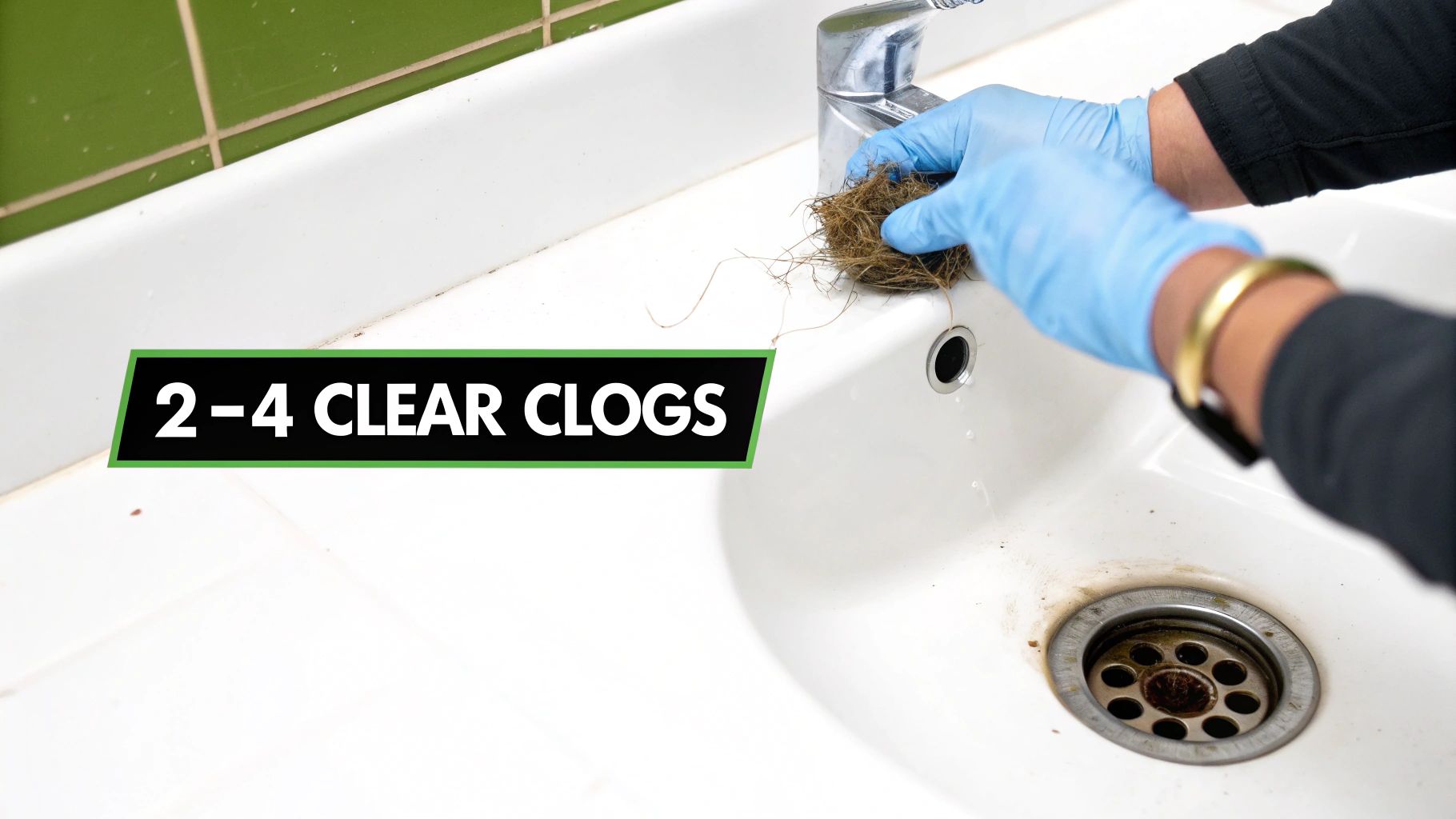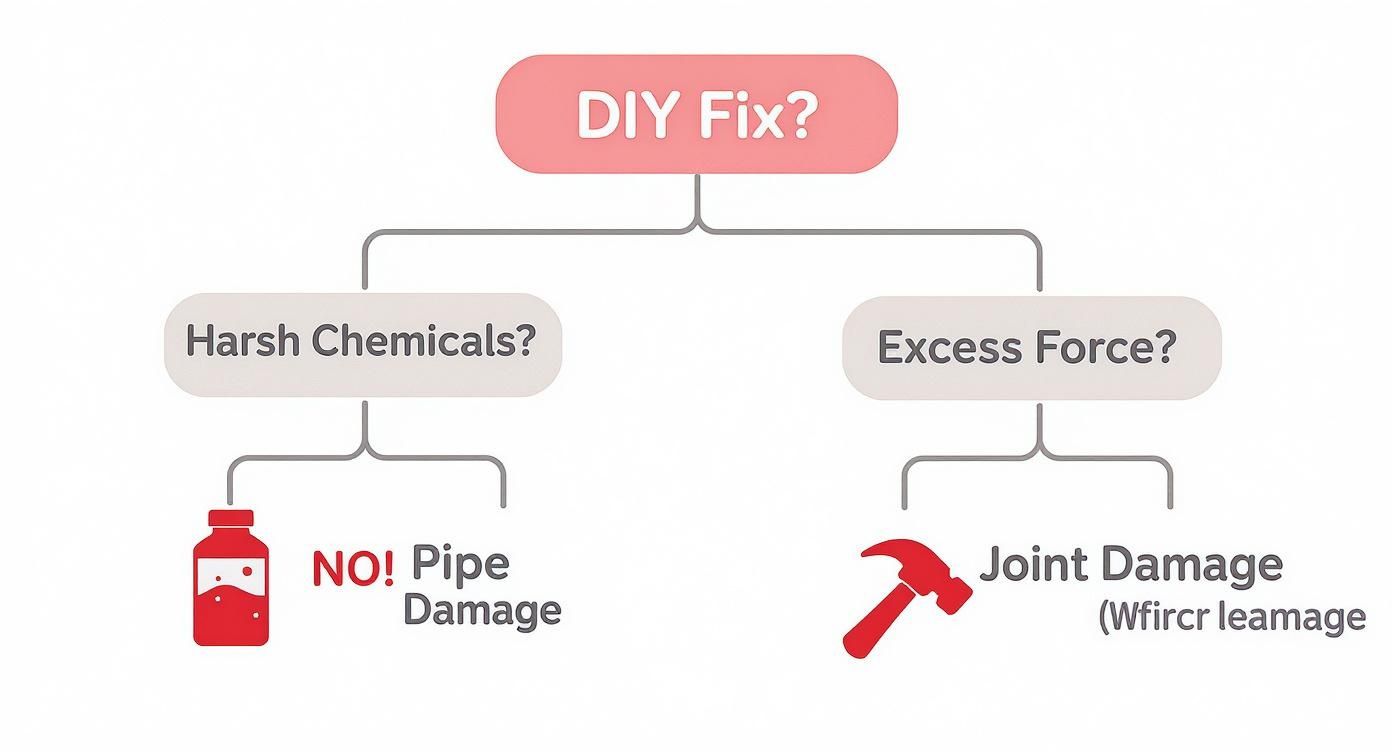How to Unblock a Pipe A Guide for Eastbourne Homes
- Luke Yeates
- Nov 5, 2025
- 13 min read
You’d be surprised how often your pipes try to tell you something’s wrong long before you’re standing in an inch of water. A bit like a car engine making a funny noise, your plumbing gives off little warning signs – a slow-draining sink here, an odd gurgling sound there. Catching these early is the key to stopping a minor nuisance from turning into a full-blown emergency. At Harrlie Plumbing and Heating, we see this all the time across Eastbourne, from Sovereign Harbour to Old Town.
Recognising the First Signs of a Blocked Pipe

Before you’re faced with a total blockage and a flooded room, your home’s plumbing system will usually send out some pretty clear distress signals. If you learn to spot them, you can get ahead of the problem. Ignoring them is a bit like ignoring the check engine light on your car – it rarely ends well.
Here in Eastbourne, we see a lot of issues with a distinctly local flavour. The notoriously hard water across Sussex is a huge factor in blocked pipes. This mineral-rich water builds up limescale deposits over time, which not only narrows the pipes but also creates a rough surface that’s perfect for trapping grease, soap scum, and other bits of debris.
Telltale Sounds and Smells
Often, the first clues are things you hear rather than see. You might notice a strange gurgling noise from the plughole after the water has gone down. That sound is trapped air being forced through a partial blockage as water struggles to get past. It’s a classic sign.
We actually had a call-out at Harrlie Plumbing and Heating to a lovely home in the Meads area where a gurgling toilet was the only symptom. It turned out to be the first warning of a serious drain issue brewing just outside the property.
Another dead giveaway is a nasty smell. If you’ve got a lingering pong of rotten food from the kitchen sink or a sewage-like odour wafting up from the bathroom drains, that’s a sure sign that waste isn't being washed away properly and is starting to decompose inside the pipes.
Visual Clues You Cannot Ignore
Beyond the sounds and smells, there are some obvious visual clues to watch for. The most common one is slow drainage. If water in your sink, bath, or shower is taking its sweet time to disappear, you’ve almost certainly got a blockage forming.
You might also spot that the water level in your toilet is either higher or lower than normal after you flush. A client of ours in the Roselands area of Eastbourne noticed this just before a major blockage occurred, so it's a symptom worth taking seriously.
It’s worth noting that these symptoms can sometimes be mistaken for other plumbing woes. For example, if just one tap is draining slowly, it might be a pressure issue. We cover this in more detail in our guide on what causes low water pressure in UK homes. But if you’re seeing slow drainage across multiple sinks or appliances, a blockage is the prime suspect.
A Pro Tip from Harrlie Plumbing: In the older Victorian terraces you see around areas like Gildrege Park in Eastbourne, the original pipework can be quite delicate. What looks like a simple clog could be complicated by the pipe's fragile condition. It’s always best to start with the gentlest unblocking methods first to avoid making things worse.
Your Essential DIY Pipe Unblocking Toolkit

Before you can even think about how to unblock a pipe, you need to have the right gear. Going into battle with a blockage without the proper equipment is like trying to do the big weekly shop at The Beacon with just a handbag – it’s frustrating, messy, and you probably won't get very far.
The good news is you don’t need a van full of expensive kit to handle most minor clogs. Your first line of defence often involves things you already have in the kitchen cupboards. For those tougher jobs, though, having a few specific tools ready can save you the time and expense of calling for help straight away.
Starting With the Basics
Before you rush out to buy anything, let's talk safety. Stubborn clogs have a nasty habit of splashing back dirty water and whatever else is causing the problem. So, some items are non-negotiable:
Heavy-duty rubber gloves to keep grime and gunk off your hands.
Protective eyewear or goggles to shield your eyes from any unexpected splashes.
Once you’re kitted out for safety, you can make your first attempt. A simple but surprisingly effective mix of bicarbonate of soda and white vinegar is a fantastic starting point. The fizzing reaction it creates is great for breaking down minor buildups of grease and soap – exactly the kind of thing we at Harrlie Plumbing and Heating see causing trouble in Eastbourne’s hard water areas.
Stepping Up to Manual Tools
If your home chemistry experiment doesn't quite cut it, it’s time to bring in some muscle. The humble plunger is your best friend here, but it's all about the technique. A standard cup plunger (the classic red one) is perfect for sinks, while a flange plunger, which has an extra flap, is designed specifically for toilets.
Harrlie Plumbing and Heating Tip: For a sink plunger to work properly, it needs to create a vacuum. The secret is to block any overflow holes with a damp cloth first. This forces all the pressure down the pipe towards the clog, making your efforts up to 50% more effective.
For blockages that are a bit further down the pipe, a plumber’s snake (also known as a drain auger) is the next tool to reach for. You feed this flexible coil down the drain until it meets the obstruction. Then, you turn the handle to either break up the clog or hook onto it so you can pull it back out.
You’ll need a gentle touch, as it’s easy to scratch porcelain or damage older, more fragile pipework if you're too aggressive. For anyone local to Eastbourne, you can pick up a basic drain auger at hardware shops like Wickes or the B&Q on the Lottbridge Drove retail park.
DIY Unblocking Methods: Severity and Suitability
Choosing the right approach is half the battle. Not every tool is right for every clog, and it’s important to understand the risks involved before you get started.
Here’s a quick rundown of your main options, what they’re good for, and a few tips from our own experience at Harrlie Plumbing and Heating.
Method | Best For | Risk Level | Harrlie's Pro Tip |
|---|---|---|---|
Bicarb & Vinegar | Minor grease, soap scum | Low | Always follow up with a kettle full of boiling water to properly flush the loosened debris away. |
Plunger | Soft blockages close to the plughole | Low | Add a bit of water to the sink so the plunger cup is submerged. This helps create a proper seal. |
Plumber's Snake | Hair clogs, deeper obstructions | Medium | Go slowly. If you feel major resistance, don't force it—you could end up damaging the pipe itself. |
This table should give you a good sense of where to start. These tools will empower you to handle many common blockages with confidence.
However, it's just as crucial to recognise when you're out of your depth. Knowing the limitations of DIY methods will help you decide when it’s time to put the tools down and call in a professional like us at Harrlie Plumbing and Heating.
Practical Methods for Clearing Common Blockages

Alright, with your tools assembled, it’s time to get your hands dirty—metaphorically, of course! Different clogs need different tactics, and the gunk causing trouble in your kitchen sink isn’t the same as the mess in your shower drain.
We’ll walk through the two most common scenarios we see at Harrlie Plumbing and Heating right here in Eastbourne homes. Remember, the goal is to be firm but gentle. Think of it less as a battle and more as a careful negotiation with your drains, especially if you live in an older property with more delicate pipework.
Tackling Kitchen Sink Clogs
The absolute classic blockage we encounter in Eastbourne, from Willingdon to Hampden Park, is in the kitchen sink. It's almost always caused by a slow, creeping build-up of fats, oils, and grease (or FOG, as we call it). Over time, this gunk coats the inside of your pipes like cholesterol in an artery, eventually choking off the flow of water completely.
This isn’t just an Eastbourne problem, either. Research from the Chartered Institute of Plumbing and Heating Engineering (CIPHE) shows that around 40% of blockages are caused by pouring FOG down kitchen sinks. It's a massive issue nationwide.
Here’s a safe, gentle method to try first:
Clear the way: Start by bailing out as much of the standing water from the sink as you can. You need a clear run at the plughole.
Bring the heat: Carefully pour a full kettle of boiling water directly down the drain. For minor, fresh grease clogs, this heat is often enough to melt the blockage and send it on its way.
The fizzing trick: If that doesn't do it, pour about half a cup of bicarbonate of soda down the drain, followed by the same amount of white vinegar. You’ll see it fizz up—that’s the chemical reaction breaking down the grime. Let it work its magic for at least an hour.
Final flush: To finish, send another kettle of boiling water down to flush everything through.
Harrlie's Eastbourne Insight: Given our hard water here in Sussex, FOG blockages can be particularly stubborn. Limescale creates a rough surface inside pipes that grease just loves to cling to. This simple bicarb and vinegar trick is genuinely the best first step before reaching for anything more forceful.
Dealing With Bathroom Blockages
The bathroom presents a completely different challenge. Here, the number one culprit is a nasty combination of hair and soap scum, which binds together to form a solid, fibrous mass that water just can’t get past. The same CIPHE report highlights that this accounts for another 30% of household clogs.
The good news is that these blockages are often much closer to the plughole and can sometimes be removed by hand.
First, pop on your rubber gloves and remove the drain cover. Use a torch to peer inside—you can often spot the clump of hair right at the top.
Using something like a bent wire coat hanger or a pair of needle-nose pliers, you can often hook onto the clog and pull the whole lot out. It’s not the most pleasant job you’ll do all week, but it’s incredibly effective.
Once it's clear, think about prevention. A simple hair catcher that fits over the plughole will stop the problem from happening again. They only cost a few pounds and are worth their weight in gold.
This manual approach is far safer for your pipes than chucking harsh chemicals down there, especially in older Eastbourne homes where the plumbing might not withstand corrosive agents. For a bit more detail, you can check out our guide on how to fix a blocked sink with easy DIY tips and tricks.
Common DIY Mistakes That Can Wreck Your Pipes
A simple blocked drain can spiral into a costly nightmare with one wrong move. When you're faced with a sink of stagnant, murky water, the temptation is to either douse it with the strongest chemical you can find or just resort to brute force. Honestly, this is where most DIY efforts go horribly wrong, turning a minor inconvenience into serious pipe damage.
Here at Harrlie Plumbing and Heating, we’ve seen the aftermath of countless well-intentioned but misguided attempts across Eastbourne. We want to help you sidestep these common pitfalls. Knowing what not to do is every bit as important as knowing the right way to tackle a blockage.
The Trouble with Harsh Chemicals
Those off-the-shelf chemical drain cleaners might promise an instant fix, but they are incredibly corrosive substances. Pouring them down your drain is a massive gamble, especially in Eastbourne's beautiful historic properties. Many older homes, particularly in areas like Old Town, still have their original lead or iron pipework. These aggressive chemicals can eat straight through them, causing hidden leaks or even a complete pipe collapse.
Even modern PVC pipes aren't immune. The intense chemical reaction generates a lot of heat, which can easily warp, soften, and weaken the plastic, leading to failed joints and future leaks.
A Cautionary Tale from the Field: We once got an emergency call-out from Harrlie Plumbing and Heating to a lovely home in Old Town where the owner had tipped an entire bottle of a powerful cleaner down a stubborn sink. The blockage didn't shift, but the chemicals ate through an old joint hidden under the floorboards. The resulting slow leak caused thousands of pounds worth of damage to their kitchen ceiling below.
The Danger of Too Much Force
When the chemicals don't work, the next impulse is often to get physical with tools like drain rods or a plumber’s snake. While these are brilliant tools in the right hands, applying too much force is a classic rookie error. It’s so easy to misjudge the pressure needed, and simply ramming a tool down the pipe can have grim consequences.
You could easily end up:
Cracking the pipe: Especially if it’s an older, more brittle material.
Forcing joints apart: A hard shove can pop pipe sections apart at their connections.
Wedging the blockage tighter: You might just compact the clog even more, making it impossible to remove without professional gear.
This trend isn't just local. Wider UK data shows that while sales of pipe unblocking products saw a 2.5% increase in the first eight months of 2025, professional call-outs for blocked pipes jumped by 6% in the same period. It suggests many DIY attempts are falling short and creating bigger problems. You can read more about these plumbing and heating industry trends on our blog.
At the end of the day, a gentle and patient approach is always the best starting point. If a blockage isn’t budging with simple, safe methods, it’s a clear signal that there's a deeper issue at play—one that needs a professional diagnosis from a team like ours at Harrlie Plumbing and Heating.
When You Should Call an Eastbourne Plumber
Knowing your limits is the smartest part of any DIY project. While it can be satisfying to tackle a minor clog yourself, there are some very clear signs that it’s time to put down the plunger and call in a professional.
Ignoring these red flags can quickly turn a simple fix into a much bigger, more expensive headache. One of the most obvious signs is a recurring blockage. If you clear a sink only for it to back up again a week later, it’s a good bet the real problem is further down the line than your DIY tools can ever hope to reach.
Another critical signal is when multiple drains in your house start acting up at the same time. For instance, does your toilet gurgle whenever the shower is running? Or are both the kitchen and bathroom sinks draining slowly? This often points to a blockage in your main sewer line, not just an individual pipe.
When DIY Is Not Enough
A main line clog is a serious issue that needs immediate professional attention. It can lead to a raw sewage backup—a significant health hazard that can also cause extensive, foul-smelling water damage to your property. If you suspect this is happening, stop using your water straight away.
This is precisely the point where we at Harrlie Plumbing and Heating step in. We’ve seen Eastbourne homeowners accidentally make things much worse by trying to force a main line blockage, which often results in cracked pipes and flooded rooms. A professional diagnosis isn't just helpful; it's crucial.
Professional plumbers have access to advanced equipment that goes far beyond a simple drain snake. We use tools like CCTV drain cameras to get a clear look at what’s causing the clog, whether it’s invasive tree roots, a collapsed pipe, or just years of severe build-up. Once we know what we're dealing with, we can use the right method to fix it. This decision tree shows why avoiding common DIY mistakes, like using harsh chemicals or excessive force, is so important.

The key takeaway here is that improper DIY methods often create more damage than the original blockage, leading to far more complex and costly professional repairs down the road.
The Professional Advantage
In the UK, the go-to professional method is high-pressure water jetting, used in about 60% of cases. It’s incredibly effective, blasting through even the most stubborn obstructions without damaging the pipes themselves.
When you're facing a persistent issue, having an expert Eastbourne plumber assess the situation is always the safest and most effective choice. For severe or relentless blockages, it's often best to contact emergency plumber services to get it sorted quickly and correctly.
Frequently Asked Questions About Blocked Drains
As plumbers, we get asked a lot of questions about how to deal with finicky drains. We've put together some straight-talking answers to the queries we hear most often from homeowners right here in Eastbourne at Harrlie Plumbing and Heating.
How Can I Prevent My Pipes From Blocking in the First Place?
Honestly, prevention is so much easier than dealing with a full-blown blockage. It all comes down to a few simple habits.
In the kitchen, the biggest enemy is grease. Never, ever pour fats or oils down the sink. A much better approach is to wipe greasy pans clean with a paper towel and toss it in the bin. A simple sink strainer is also a game-changer for catching those little food scraps that would otherwise build up over time.
For the bathroom, hair is the main culprit. A cheap hair catcher that sits over the plughole will save you a world of trouble. Beyond that, I always tell our clients to give their drains a monthly flush with a kettle full of boiling water. It's a quick way to dissolve any soap scum or grime that's starting to cling to the pipes. This is especially important in a hard water area like Eastbourne, where mineral deposits can make clogs even more stubborn.
Are Chemical Drain Cleaners Actually Safe to Use?
Frankly, we're not fans of them at all. While that promise of a quick fix is tempting, those harsh chemicals can be brutal on your plumbing. We've seen them corrode and weaken older metal pipes and even damage certain types of PVC. They also give off some pretty nasty fumes and pose a real risk if they splash back at you.
It's far safer and often more effective to tackle a clog with a good old-fashioned plunger or a drain snake. If those tools don't shift it, that's your cue to call in a professional. We at Harrlie Plumbing and Heating can figure out what's really going on without putting your pipes at risk.
What If Every Drain in My House Is Slow?
If you're noticing that the toilet, shower, and sinks are all draining sluggishly at the same time, that's a massive red flag. This isn't a small, isolated clog; it almost certainly points to a problem deep down in your main sewer line.
This is absolutely not a job for a DIY enthusiast. A main line blockage could be caused by anything from tree roots breaking into the pipe to a section collapsing underground. The first thing you need to do is stop using any water to prevent a nasty sewage backup into your home. Then, call a professional plumber immediately.
We have specialised gear, like CCTV drain cameras, to find the exact source of the problem and clear it safely. It's also worth thinking about long-term prevention. For instance, understanding how a water softener works can be really beneficial, as it helps prevent the kind of mineral scale buildup that contributes to these major blockages over time.
If you're struggling with a stubborn blockage or have a plumbing emergency on your hands in Eastbourne, don't wait for it to get worse. Contact Harrlie Plumbing and Heating for a fast, professional solution. Visit our website to book a call-out or get a free quote today!

Comments